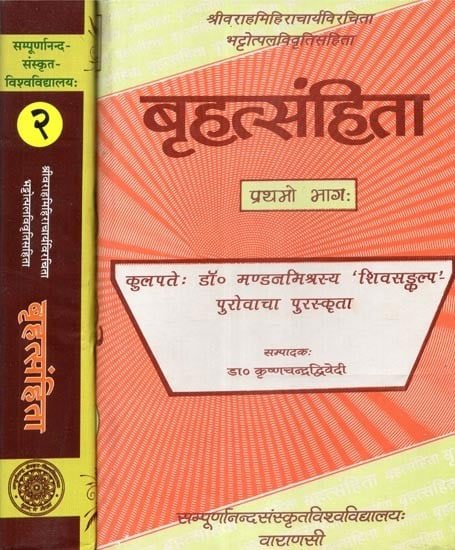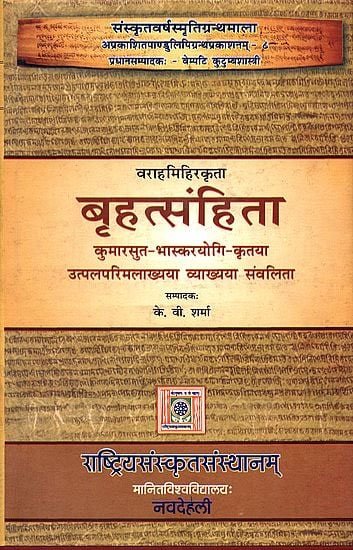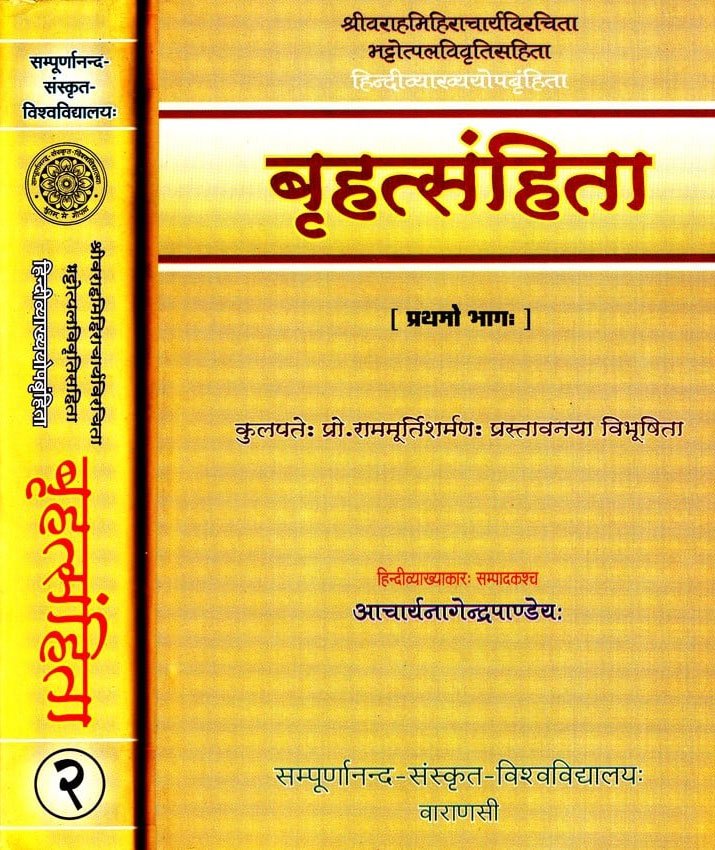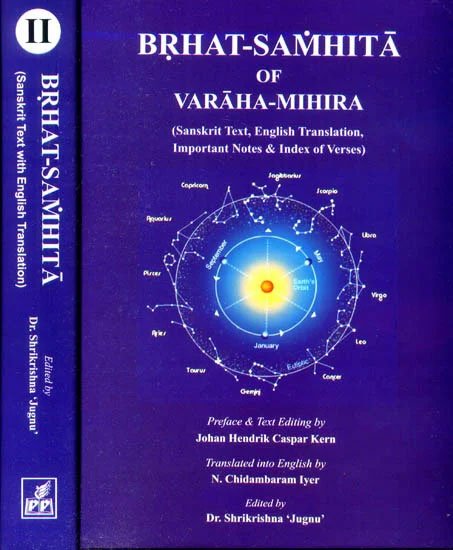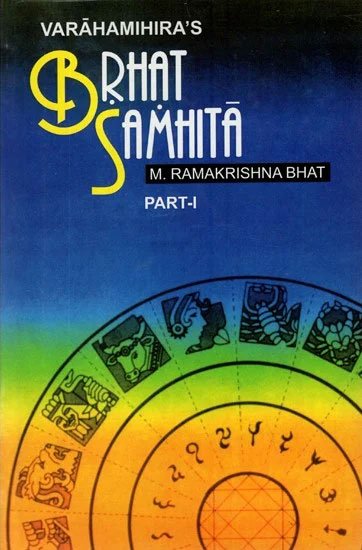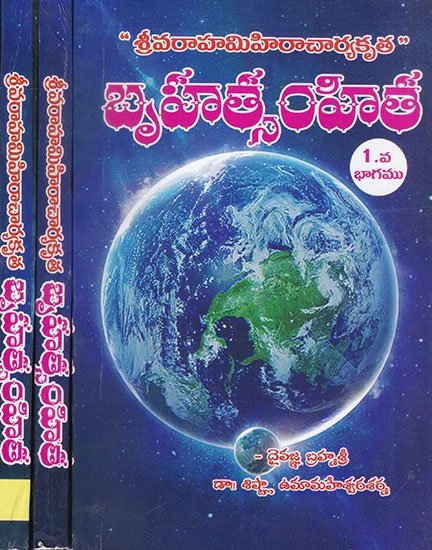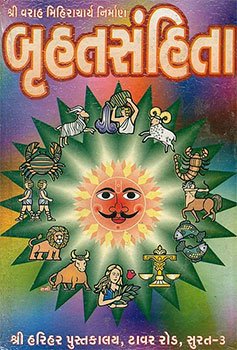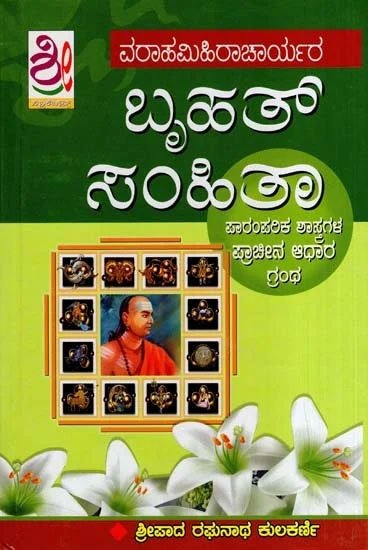Brihat-samhita [sanskrit]
26,560 words
The Sanskrit text of the Brihat-samhita from the 6th-century authored by Varaha Mihira in present-day Ujjain, India. It primarily deals with astrology and astronomy but is presented as an encyclopedia of knowledge.
Verse 87.36
हुंहुंगुग्लुगिति प्रियामभिलषन् क्रोशत्युलूको मुदा पूर्णः स्याद्गुरुलु प्रदीप्तमपि च ज्ञेयं सदा किस्किसि ।
विज्ञेयः कलहो यदा बलबलं तस्य असकृद्वाशितं दोषायैव टटट्टटेति न शुभाः शेषास्तु दीप्त स्वराः ॥ ३६ ॥
[तस्याः । दीप्ताः]
huṃhuṃguglugiti priyāmabhilaṣan krośatyulūko mudā pūrṇaḥ syādgurulu pradīptamapi ca jñeyaṃ sadā kiskisi |
vijñeyaḥ kalaho yadā balabalaṃ tasya asakṛdvāśitaṃ doṣāyaiva ṭaṭaṭṭaṭeti na śubhāḥ śeṣāstu dīpta svarāḥ || 36 ||
[tasyāḥ | dīptāḥ]
The Sanskrit text of Verse 87.36 is contained in the book Brihata Samhita (Sanskrit Text with Hindi Translation) by Pandit Achyutananda Jha. This book is available online or you could buy the latest edition:
Read online Buy now! The Sanskrit text by Pandit Achyutananda Jha (2001)
Glossary of Sanskrit terms
Note: This extracts Sanskrit terms and links to English definitions from the glossary, based on an experimental segmentation of verse (87.36). Some terms could be superfluous while some might not be mentioned. Click on the word to show English definitions.
Pri, Priya, Abhi, Lashat, Kroshat, Uluka, Mud, Muda, Purna, Syat, Sya, Guru, Pradipta, Api, Jneya, Sada, Sad, Vijneya, Kalaha, Yada, Yad, Bala, Tad, Tas, Asakrit, Vashita, Dosha, Shubha, Shesha, Dipta, Svara,
Analysis of Sanskrit grammar
Note: this is an experimental feature and only shows the first possible analysis of the Sanskrit text (Verse 87.36). If the system was successful in segmenting the sentence, you will see of which words it is made up of, generally consisting of Nouns, Pronouns, Verbs, Participles and Indeclinables. Click on the link to show all possible derivations of the word.
- Line 1: “huṃhuṃguglugiti priyāmabhilaṣan krośatyulūko mudā pūrṇaḥ syādgurulu pradīptamapi ca jñeyaṃ sadā kiskisi ”
- Cannot analyse huṃhuṅguglugiti*pr
- priyām -
-
prī (noun, masculine)[genitive plural], [locative single]prī (noun, feminine)[genitive plural], [locative single]priyā (noun, feminine)[accusative single]
- abhi -
-
abhi (indeclinable preposition)[indeclinable preposition]abhi (noun, masculine)[compound], [adverb]abhi (noun, neuter)[compound], [adverb], [nominative single], [vocative single], [accusative single]abhi (noun, feminine)[compound], [adverb]abhī (noun, masculine)[adverb]abhī (noun, neuter)[compound], [adverb], [nominative single], [vocative single], [accusative single]abhī (noun, feminine)[adverb]
- laṣan -
-
√laṣ -> laṣat (participle, masculine)[nominative single from √laṣ class 1 verb], [vocative single from √laṣ class 1 verb]
- krośatyu -
-
krośat (noun, masculine)[locative single]krośat (noun, neuter)[nominative dual], [vocative dual], [accusative dual], [locative single]√kruś -> krośat (participle, masculine)[locative single from √kruś class 1 verb]√kruś -> krośat (participle, neuter)[nominative dual from √kruś class 1 verb], [vocative dual from √kruś class 1 verb], [accusative dual from √kruś class 1 verb], [locative single from √kruś class 1 verb]√kruś (verb class 1)[present active third single]
- ulūko* -
-
ulūka (noun, masculine)[nominative single]
- mudā -
-
mud (noun, feminine)[instrumental single]mudā (noun, feminine)[nominative single]
- pūrṇaḥ -
-
pūrṇa (noun, masculine)[nominative single]√pṝ -> pūrṇa (participle, masculine)[nominative single from √pṝ class 3 verb], [nominative single from √pṝ class 6 verb], [nominative single from √pṝ class 9 verb]
- syād -
-
syāt (indeclinable adverb)[indeclinable adverb]syāt (indeclinable)[indeclinable]sya (noun, neuter)[adverb], [ablative single]√as (verb class 2)[optative active third single]
- guru -
-
guru (noun, masculine)[compound], [adverb]guru (noun, neuter)[compound], [adverb], [nominative single], [vocative single], [accusative single]gurū (noun, masculine)[adverb], [vocative single]gurū (noun, feminine)[compound], [adverb], [vocative single]gurū (noun, neuter)[compound], [adverb], [nominative single], [vocative single], [accusative single]
- lu -
-
lo (noun, masculine)[adverb]lū (noun, masculine)[adverb], [vocative single]lū (noun, neuter)[compound], [adverb], [nominative single], [vocative single], [accusative single]lū (noun, feminine)[adverb], [vocative single]
- pradīptam -
-
pradīpta (noun, masculine)[adverb], [accusative single]pradīpta (noun, neuter)[adverb], [nominative single], [accusative single]pradīptā (noun, feminine)[adverb]
- api -
-
api (indeclinable preposition)[indeclinable preposition]ap (noun, neuter)[locative single]
- ca -
-
ca (indeclinable conjunction)[indeclinable conjunction]ca (noun, masculine)[compound], [vocative single]ca (noun, neuter)[compound], [vocative single]
- jñeyam -
-
jñeya (noun, masculine)[adverb], [accusative single]jñeya (noun, neuter)[adverb], [nominative single], [accusative single]jñeyā (noun, feminine)[adverb]√jñā -> jñeya (participle, masculine)[accusative single from √jñā class 3 verb], [accusative single from √jñā class 9 verb]√jñā -> jñeya (participle, neuter)[nominative single from √jñā class 3 verb], [accusative single from √jñā class 3 verb], [nominative single from √jñā class 9 verb], [accusative single from √jñā class 9 verb]
- sadā -
-
sadā (indeclinable)[indeclinable]sad (noun, masculine)[instrumental single]sad (noun, neuter)[instrumental single]sadā (noun, feminine)[nominative single]
- Cannot analyse kiskisi
- Line 2: “vijñeyaḥ kalaho yadā balabalaṃ tasya asakṛdvāśitaṃ doṣāyaiva ṭaṭaṭṭaṭeti na śubhāḥ śeṣāstu dīpta svarāḥ || 36 |”
- vijñeyaḥ -
-
vijñeya (noun, masculine)[nominative single]
- kalaho* -
-
kalaha (noun, masculine)[nominative single]
- yadā -
-
yadā (indeclinable adverb)[indeclinable adverb]yadā (indeclinable relative)[indeclinable relative]yadā (indeclinable)[indeclinable]yad (noun, masculine)[instrumental single]
- bala -
-
bala (noun, masculine)[compound], [vocative single]bala (noun, neuter)[compound], [vocative single]√bal (verb class 1)[imperative active second single]
- balam -
-
bala (noun, masculine)[adverb], [accusative single]bala (noun, neuter)[adverb], [nominative single], [accusative single]balā (noun, feminine)[adverb]
- tasya -
-
√tas -> tasya (absolutive)[absolutive from √tas]ta (noun, masculine)[genitive single]ta (noun, neuter)[genitive single]tad (noun, neuter)[genitive single]tas (noun, masculine)[locative single]tas (noun, neuter)[nominative dual], [vocative dual], [accusative dual], [locative single]sa (noun, masculine)[genitive single]√tas (verb class 4)[imperative active second single]
- asakṛd -
-
asakṛt (indeclinable)[indeclinable]asakṛt (noun, masculine)[compound], [adverb], [nominative single], [vocative single]asakṛt (noun, feminine)[compound], [adverb], [nominative single], [vocative single]asakṛt (noun, neuter)[compound], [adverb], [nominative single], [vocative single], [accusative single]
- vāśitam -
-
vāśita (noun, masculine)[adverb], [accusative single]vāśita (noun, neuter)[adverb], [nominative single], [accusative single]vāśitā (noun, feminine)[adverb]√vāś -> vāśita (participle, masculine)[accusative single from √vāś class 4 verb]√vāś -> vāśita (participle, neuter)[nominative single from √vāś class 4 verb], [accusative single from √vāś class 4 verb]
- doṣāyai -
-
doṣa (noun, masculine)[dative single]doṣā (noun, feminine)[dative single]
- aiva -
-
√i (verb class 2)[imperfect active first dual]
- Cannot analyse ṭaṭaṭṭaṭeti*na
- na -
-
na (indeclinable particle)[indeclinable particle]na (noun, masculine)[compound], [vocative single]na (noun, neuter)[compound], [vocative single]
- śubhāḥ -
-
śubha (noun, masculine)[nominative plural], [vocative plural]śubhā (noun, feminine)[nominative plural], [vocative plural], [accusative plural]
- śeṣās -
-
śeṣa (noun, masculine)[nominative plural], [vocative plural]śeṣā (noun, feminine)[nominative plural], [vocative plural], [accusative plural]
- tu -
-
tu (indeclinable particle)[indeclinable particle]
- dīpta -
-
dīpta (noun, masculine)[compound], [vocative single]dīpta (noun, neuter)[compound], [vocative single]
- svarāḥ -
-
svara (noun, masculine)[nominative plural], [vocative plural]svarā (noun, feminine)[nominative plural], [vocative plural], [accusative plural]
- Cannot analyse 36
- Line 3: “[tasyāḥ ”
- tasyāḥ -
-
sā (noun, feminine)[ablative single], [genitive single]
Other editions:
Also see the following editions of the Sanskrit text or (alternative) English translations of the Verse 87.36
Brhatsamhita with the Commentary of Bhattotpala
by Krishna Chandra Dwivedi (2016)
Publisher: Sampurnanand Sanskrit University; 1229 pages;
Buy now!
Brihat Samhita with the Commentary of Utpalapatimala of Yogisvara
by K. V. Sharma (2012)
Publisher: Rashtriya Sanskrit Sansthan, Janakpuri; 754 pages; ISBN-10; 8186111360; ISBN-13: 9788186111369
Buy now!
Brihat Samhita (Hindi Translation)
by K. V. Sharma (2002)
Publisher: Sampurnanand Sanskrit University; 2359 pages; ISBN-13: 9789387890008.
Buy now!
Brhat Samhita (English translation)
by N. Chidambaram Iyer (2022)
Publisher: Parimal Publication Pvt. Ltd.; 801 pages; Edited by Dr. Shrikrishna Jugnu; ISBN-10: 8171104215; ISBN-13: 9788171104215.
Buy now!
Brhat Samhita (English with notes)
by M. Ramakrishna Bhat (2010)
Publisher: Motilal Banarsidas Publishers Pvt. Ltd.; 1155 pages; ISBN-10: 8120810600; ISBN-13: 9788120810600.
Buy now!
Brhat Samhita (Telugu translation)
by Sishtla Umamaheswara Sharma (2020)
Publisher: Mohan Publications, Andhra Pradesh; 846 pages.
Buy now!Preview of verse 87.36 in Kannada sript:
ಹುಂಹುಂಗುಗ್ಲುಗಿತಿ ಪ್ರಿಯಾಮಭಿಲಷನ್ ಕ್ರೋಶತ್ಯುಲೂಕೋ ಮುದಾ ಪೂರ್ಣಃ ಸ್ಯಾದ್ಗುರುಲು ಪ್ರದೀಪ್ತಮಪಿ ಚ ಜ್ಞೇಯಂ ಸದಾ ಕಿಸ್ಕಿಸಿ ।
ವಿಜ್ಞೇಯಃ ಕಲಹೋ ಯದಾ ಬಲಬಲಂ ತಸ್ಯ ಅಸಕೃದ್ವಾಶಿತಂ ದೋಷಾಯೈವ ಟಟಟ್ಟಟೇತಿ ನ ಶುಭಾಃ ಶೇಷಾಸ್ತು ದೀಪ್ತ ಸ್ವರಾಃ ॥ ೩೬ ॥
[ತಸ್ಯಾಃ । ದೀಪ್ತಾಃ]
Brhat Samhita (Gujarati translation)
by - (2000)
Publisher: Shree Harihar Pustakalay, Surat; Author: Shri Varahamihira Acharya (શ્રી વરાહમિહીરાચાર્ય); 432 pages.
Buy now!Preview of verse 87.36 in Gujarati sript:
હુંહુંગુગ્લુગિતિ પ્રિયામભિલષન્ ક્રોશત્યુલૂકો મુદા પૂર્ણઃ સ્યાદ્ગુરુલુ પ્રદીપ્તમપિ ચ જ્ઞેયં સદા કિસ્કિસિ ।
વિજ્ઞેયઃ કલહો યદા બલબલં તસ્ય અસકૃદ્વાશિતં દોષાયૈવ ટટટ્ટટેતિ ન શુભાઃ શેષાસ્તુ દીપ્ત સ્વરાઃ ॥ ૩૬ ॥
[તસ્યાઃ । દીપ્તાઃ]
Brhat Samhita (Kannada translation)
by Sripada Raghunatha Kulkarni (2021)
Publisher: Srinidhi Publications, Bangalore; 668 pages with illustrations.
Buy now!Preview of verse 87.36 in Kannada sript:
ಹುಂಹುಂಗುಗ್ಲುಗಿತಿ ಪ್ರಿಯಾಮಭಿಲಷನ್ ಕ್ರೋಶತ್ಯುಲೂಕೋ ಮುದಾ ಪೂರ್ಣಃ ಸ್ಯಾದ್ಗುರುಲು ಪ್ರದೀಪ್ತಮಪಿ ಚ ಜ್ಞೇಯಂ ಸದಾ ಕಿಸ್ಕಿಸಿ ।
ವಿಜ್ಞೇಯಃ ಕಲಹೋ ಯದಾ ಬಲಬಲಂ ತಸ್ಯ ಅಸಕೃದ್ವಾಶಿತಂ ದೋಷಾಯೈವ ಟಟಟ್ಟಟೇತಿ ನ ಶುಭಾಃ ಶೇಷಾಸ್ತು ದೀಪ್ತ ಸ್ವರಾಃ ॥ ೩೬ ॥
[ತಸ್ಯಾಃ । ದೀಪ್ತಾಃ]
![Brihat-samhita [sanskrit] - book cover](/uploads/a/Brihat-Samhita-Sanskrit.jpg)
